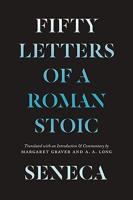
Chicago (2021) p/b 338pp £13.00 ISBN 9780226782935
In these days of cancel culture and non-platforming when over sensitive ‘snowflake’ students are deemed to need protection from any ideas which may challenge the woke orthodoxy, it is a relief to be directed to the calm and measured way in which Seneca lays out, in a series of letters to his friend Lucilius, what in his view constitutes the good life. His approach is all the more commendable as, in his situation, the consequences of giving offence could be not only social ostracism, but, as is pointed out in the introduction to this translation of fifty of his letters, imprisonment, torture and execution.
In 2015 Chicago did the great service of publishing G. and L.’s magisterial translation and commentary on all 124 surviving letters to Lucilius (Seneca: Letters on Ethics to Lucilius). Classics for All published a complimentary review (here), but hoped that a cheaper edition would be made available. It did so in 2017, but was still comparatively expensive.
With this volume G. and L. have now produced a very reasonably priced soft covered selection of slightly under half of the full corpus of Letters to Lucilius.
In a short preface, they state that in their selection they ‘have tried to illustrate the range and variety of S.’s subject matter from the experiences of his daily life … to his intellectual interests in philosophy and literature.’ They indicate only one or two minor revisions of the translation in their larger work. In their introduction they offer a most helpful four-page excursus on S.’s philosophical stance. This can, at the risk of oversimplification, perhaps be described as his somewhat eclectic stoicism with its call to be the master not the slave of one’s emotions.
The letters are translated into straightforward, unpretentious English, reflecting the tone which, at any time, S. wishes to create. A good example is the beginning and end of letter 53 ‘A bad experience at sea’. It begins, ‘quid non potest mihi persuaderi, cui persuasum est ut navigarem?’ which is translated, ‘What cannot I be talked into? This time I was persuaded to take a trip by boat!’ After drawing certain philosophical conclusions from this experience, the letter concludes, ‘incredibilis philosophiae vis est ad omnem fortituitam vim retundendam. nullum telum in corpore eius sedet: munita est, solida. quaedam defatigat et velut levia tela laxo sinu eludit, quaedam discutit et in eum usque, qui miserat, respuit.’ This is translated: ‘It is amazing what power there is in philosophy to beat back all the assaults of chance. No weapon lodges in its flesh; its defences cannot be penetrated. When fortune’s darts come in, it either ducks and lets them pass by, or stands its ground and lets them bounce back against the assailant.’ Those without Latin can be assured that they are being offered an opportunity to prove G. and L.’s dictum in their introduction that ‘The best way to learn about S. as a person and as a philosopher, is to read his letters.’
The notes, helpfully signposted, explain philosophical terms and literary references and there is a two-page bibliography and a comprehensive index.
The reader is enabled to pass beyond a simple study of the history of ideas to be offered tools to address contemporary moral values and issues.
The CfA reviewer of their earlier work wrote, ‘Stoic ideas are as relevant today as they were in the days of the emperor Nero, and G. and L. have done S. (and us) a great service in making the old man speak so clearly once again.’ A conclusion which the reviewer of this present work respectfully and wholeheartedly endorses.
Ray Morris
